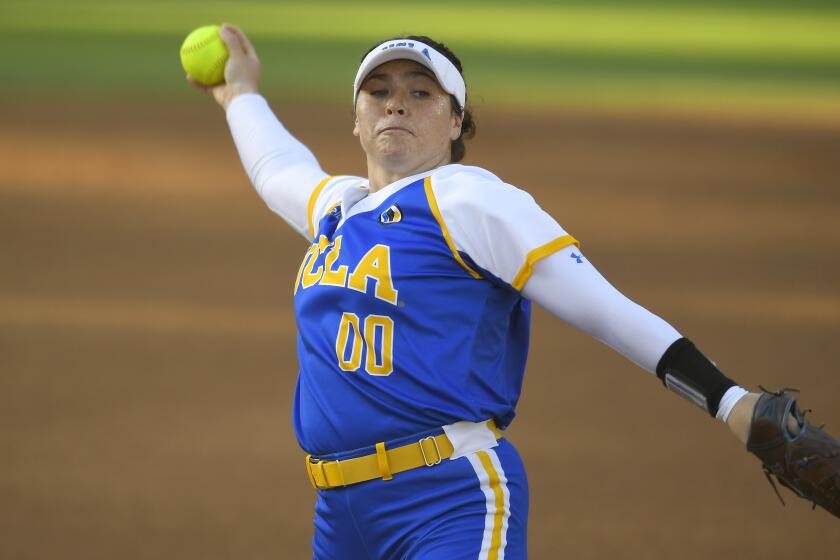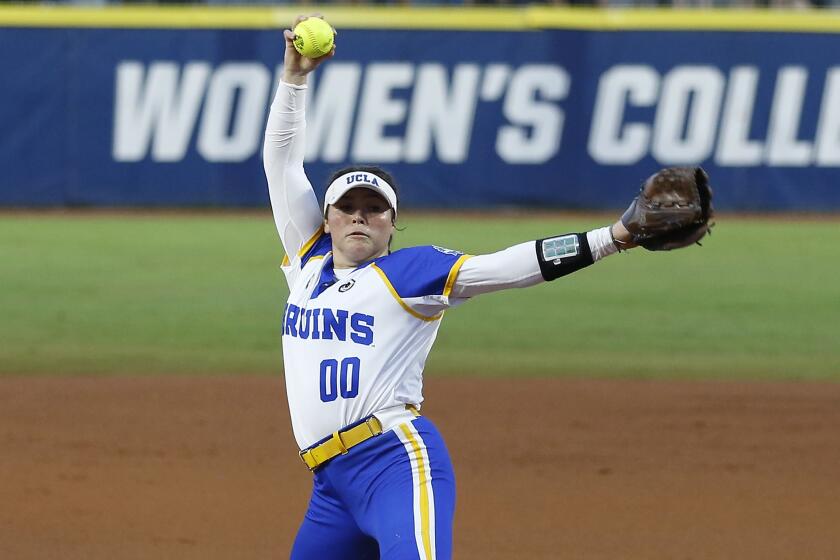Pitchers shoulder heavy load at Women’s College World Series
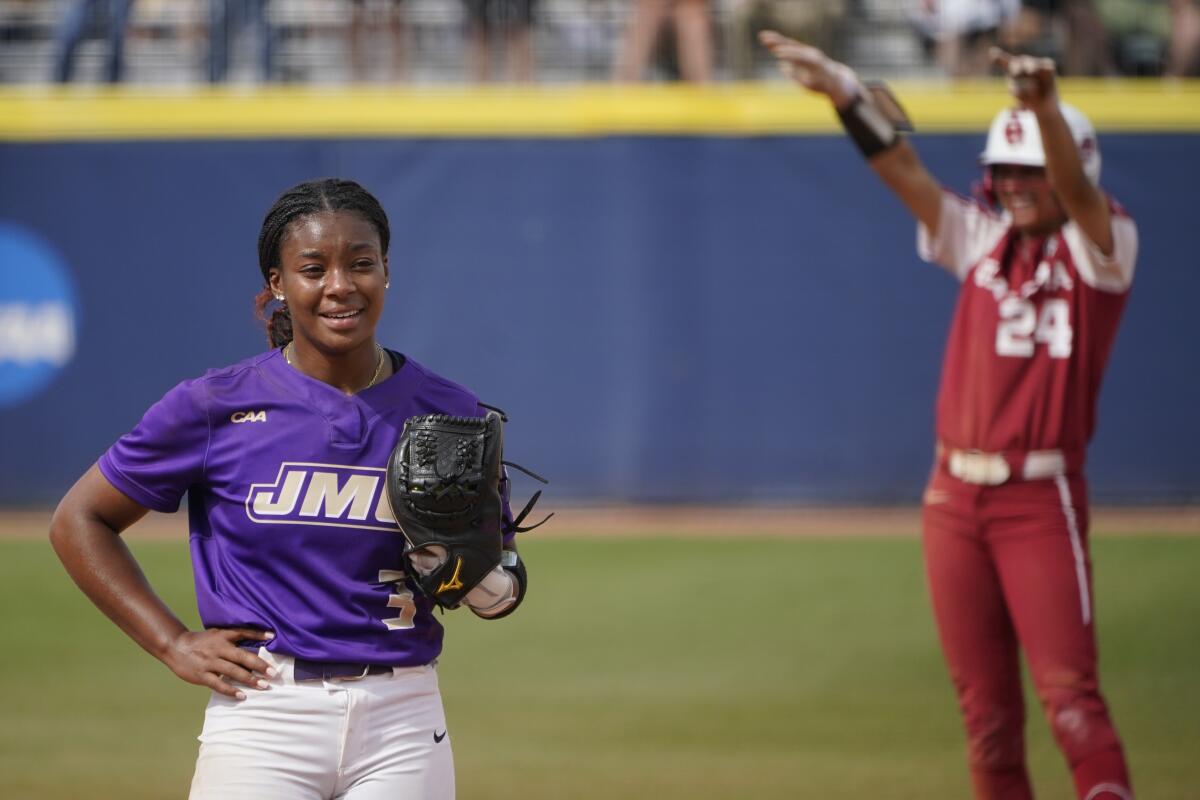
- Share via
OKLAHOMA CITY — Odicci Alexander winced in pain as a not-as-soft-as-advertised ball bounced off her left foot in the batter’s box. James Madison’s star pitcher would lose some toenails after getting hit by the pitch in a game Sunday, ESPN reported the day after, but Alexander dutifully stepped back into the circle when called. When she pitched, the right-hander dragged her injured foot through the dirt.
“Blood, sweat and tears,” Alexander said. “I was going to keep pitching for my teammates.”
Alexander’s heroic effort pitching James Madison to the national semifinals — the longest run for an unseeded team at the Women’s College World Series — won hearts as she became the latest pitcher to step into the spotlight on college softball’s biggest annual stage.
Along with an electrifying defensive play and trending on Twitter, the redshirt senior threw 434 pitches in four games in Oklahoma City, where No. 1 Oklahoma and No. 10 Florida State play in a best-of-three championship series starting Tuesday.
The Sooners advanced to the finals after Giselle Juarez, pitching her third game in three days, threw 118 pitches in a 7-1 win over James Madison on Monday.
A triple-digit pitch count is standard for hard-working aces in Oklahoma City, where pitchers often take the circle for consecutive days or start twice in a day for doubleheaders. Some pitchers are two-way stars, such as Alexander and UCLA’s Rachel Garcia, who are top hitters.
Garcia threw 217 pitches in the first two days of the tournament, but the No. 2 Bruins fell into the losers’ bracket, forcing them to play an elimination game while competing for a third consecutive day. She hurled 106 more pitches in a season-ending 10-3 loss to Oklahoma.
Rachel Garcia pitched a shutout and Maya Brady delivered a home run during UCLA’s 4-0 win over FSU to open the Women’s College World Series on Thursday.
The last time Garcia carried a similar load, it ended differently for the Bruins. It wasn’t the plan to have the right-hander throw 603 pitches in five games over six days in 2019, but she trained as if it were.
Before the Olympian tossed 36 of UCLA’s 38 innings en route to the 2019 national championship, Garcia was jumping rope and sprinting on a stationary bike in between bullpen throws. Her heart was racing, but each beat strengthened her mind as much as it did her body.
“If the athlete is trained and conditioned and prepared, it’s really who’s got the largest amount of guts,” UCLA assistant Lisa Fernandez said.
Fernandez overhauled how UCLA’s pitchers and catchers prepare when she took over bullpen coaching duties in 2019. The three-time Olympic gold medalist instilled her own mentality of outworking her opponents to her pupils, instituting “champ camps” during bullpen sessions.
UCLA’s pitchers alternate cardio exercises with pitching to test their physical performance while fatigued. They wear tights and sleeves under their uniforms to simulate the overheated feeling of pitching in Oklahoma City’s June humidity.
The training paid off for Garcia when she threw 179 pitches in a 10-inning victory over Washington in the national semifinal. The pitcher had enough energy to hit the walk-off home run despite feeling fatigued in the punishing heat.
“I just had this gut feeling of this is our time,” Garcia said. “We worked our butts off to get to that moment.”
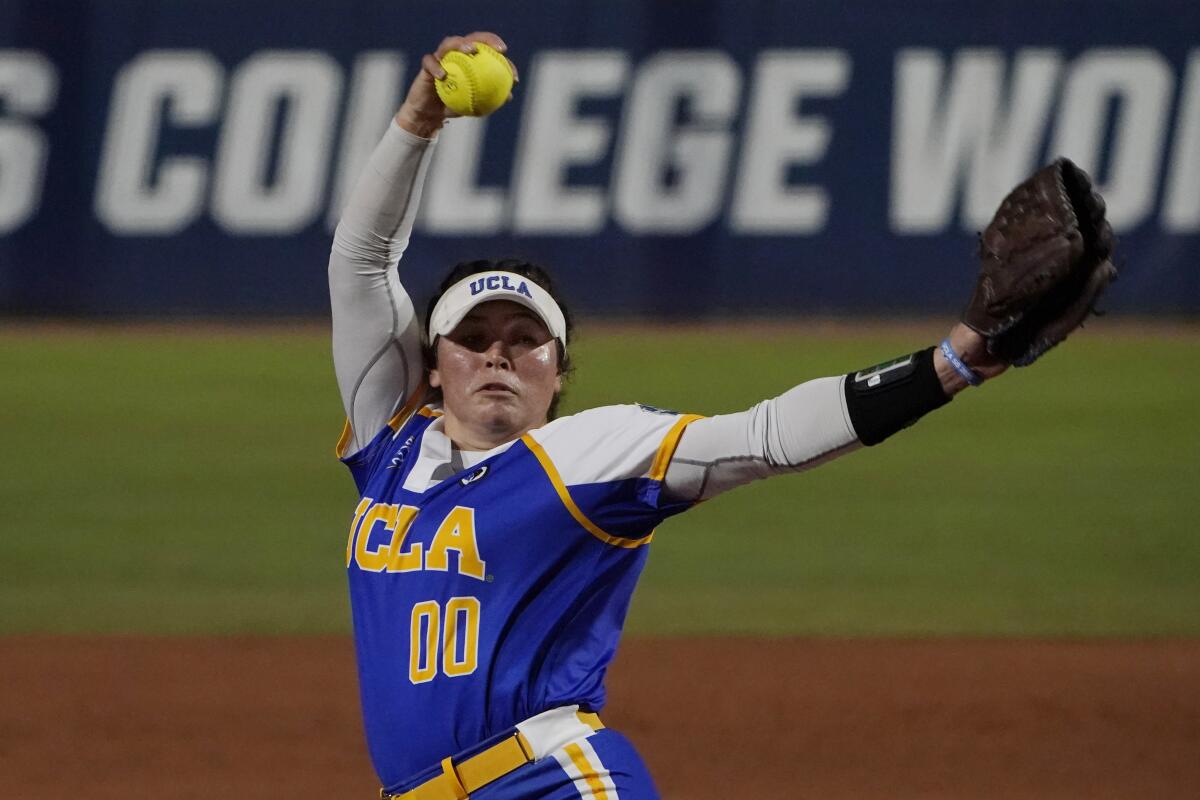
Pitchers train for those moments from a young age. While baseball teams often stock deep pitching staffs, softball rosters don’t run longer than three or four pitchers. Youth tournaments often feature three or four games a day, said former Washington pitcher Danielle Lawrie, who pitched the Huskies to the NCAA title in 2009.
Lawrie accumulated a 42-8 record, 0.97 ERA and 521 strikeouts that season. She pitched 352 2/3 innings, an astronomical number that could have been higher if Lawrie hadn’t sat out for three weeks because of a stress fracture in her forearm.
“For me, it was all I knew,” Lawrie said of the heavy workload.
Lawrie limited throwing sessions during the week to save her body for the weekends. She worked with pitching coach Lance Glasoe to monitor how she felt after each practice and whether she needed an extra day of rest.
After throwing two complete games, including a 15-inning marathon, in an NCAA regional doubleheader against Massachusetts in 2009, Lawrie remembers needing several extra days. She threw 395 pitches in one day: 144 in a 5-1, seven-inning loss and 251 in the second game that started 30 minutes later.
The next morning, her shoulder and back muscles reminded her of each one.
“I literally [felt] like I got run over by a truck,” Lawrie said.
The common line about softball’s lack of a pitch count focuses on the “natural” throwing motion. But research has debunked some of those theories.
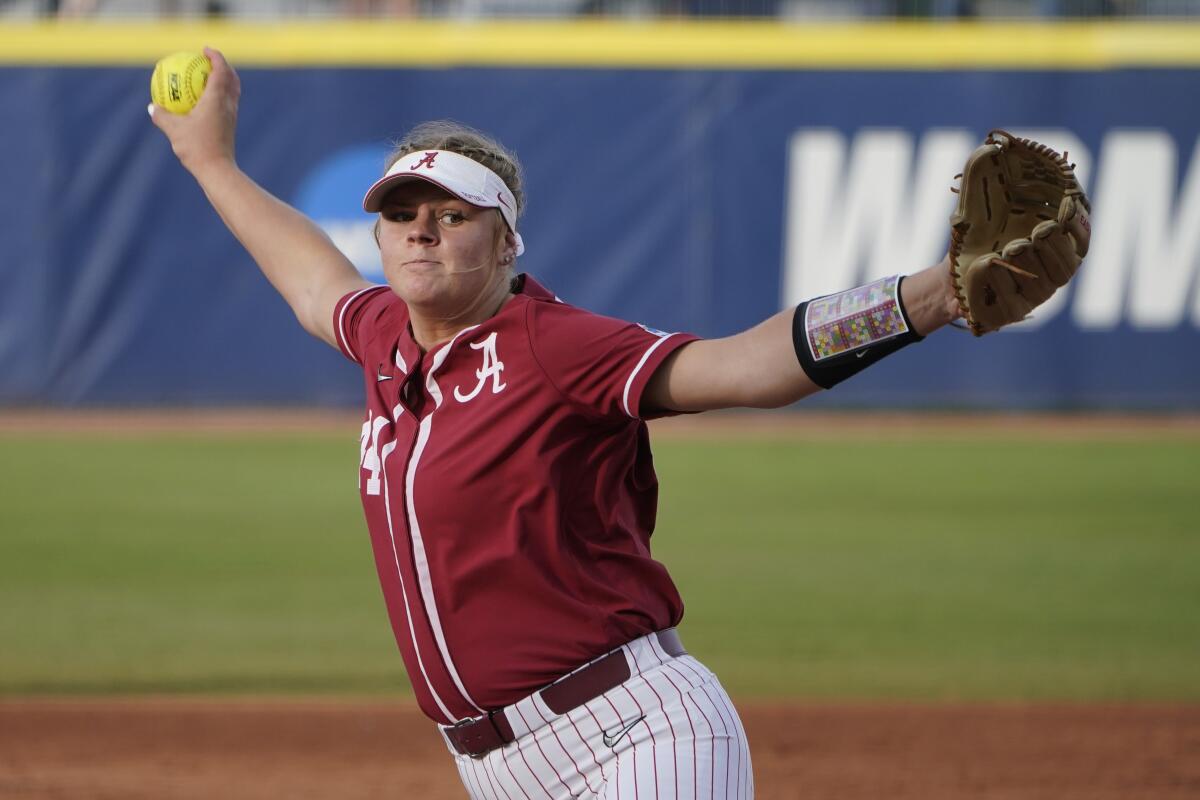
A 1998 study by researchers at the American Sports Medicine Institute examined the pitching motion of eight female softball pitchers and found that players experience significant strain on their joints. Peak compressive forces at the elbow and shoulder were equal to 70% to 98% of body weight for softball pitchers while compressive forces at the elbow and shoulder for baseball pitchers topped out between 80% to 120% of body weight.
Differences in the sports “prevent a direct comparison to overhand pitching,” the authors wrote, “however, these results question the assumption that underhand pitching does not create significant stress on the shoulder and elbow.”
A 2017 study by researchers from the Washington University School of Medicine in St. Louis showed that pitchers experience progressive increase in shoulder fatigue, pain and weakness during two- and three-day tournaments without full recovery between consecutive days of pitching. Maintaining proper technique and good posture while slowly ramping up for a season to limit common early-season injuries were recommended to protect athletes from long-term harm.
Long outings during her youth and college career didn’t jeopardize Lawrie’s future in softball. She played professionally for four years, and the mother of two is returning to pitch for Team Canada in the Tokyo Olympics, which will be her second Olympic appearance.
Despite her own experience, Lawrie doesn’t wish the same workload on today’s young pitchers.
“I hope that the game is evolving in a way where one pitcher is not having to throw three or four games because it really is a lot,” Lawrie said. “It’s not like it does a whole ton of damage on your arm, but I think mentally, it can wear on you a little bit.”
Rachel Garcia hits a three-run homer but is chased in the sixth inning of a 10-3 loss to Oklahoma, which advances in the Women’s College World Series.
Oklahoma epitomizes the new style with the best offense in the country and a pitch-by-committee bullpen. The Sooners boast a .410 team batting average and are hitting 2.72 home runs per game.
Yet, as James Madison’s Alexander showed, pitching can still win the day.
She shut down the potent Oklahoma offense in the first round, giving up six hits and striking out nine in a 4-3, eight-inning victory that sent the Sooners into the losers’ bracket.
Oklahoma rallied through four elimination games, including back-to-back wins over Alexander, whose fatigue was evident after facing the Sooners three times during the tournament. She gave up six runs in Monday’s elimination game and talked her way out of an early hook before finally exiting after throwing 1,057 pitches during the three-weekend NCAA tournament.
The Oklahoma City crowd, mostly wearing Oklahoma’s crimson and cream, rose to its feet as Alexander fought back tears.
More to Read
Go beyond the scoreboard
Get the latest on L.A.'s teams in the daily Sports Report newsletter.
You may occasionally receive promotional content from the Los Angeles Times.

